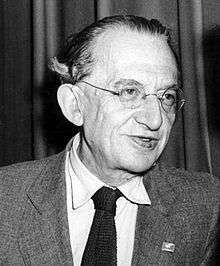
From a very early stage the ideological history of the bourgeoisie was nothing but a desperate resistance to every insight into the true nature of the society it had created.
György Lukács (13 April 1885 – 4 June 1971) was a Hungarian philosopher, æsthetician, literary historian, critic, and Marxist.
Quotes
- Admirers of the ‘purified’ Nietzsche have been hard put to unite his sanctioning of barbarity with an often subtle and rarefied cultural critique. But we can easily dispose of this dichotomy. In the first place, the union of ultra-refinement and brutality was by no means a personal quirk requiring psychological elucidation, but a universal, psychical-moral distinguishing mark of imperialist decadence.
- The Destruction of Reason, Chapter 3, “Nietzsche as Founder of Irrationalism in the Imperialist Period” § 3
History and Class Consciousness (1968)
- as translated by Rodney Livingstone (MIT Press: 1971)
- Only the dialectical conception of ... reality as a social process ... dissolves the fetishistic forms necessarily produced by the capitalist mode of production and enables us to see them as mere illusions which are not less illusory for being seen to be necessary.
- p. 13
- Unmediated concepts ... veil the relations between objects. ... They are, therefore, objects of knowledge, but the object which is known through them is not the capitalist system of production itself, but the ideology of its ruling class.
- pp. 13-14
- The function of these unmediated concepts that have been derived from the fetishistic forms of objectivity is to make the phenomena of capitalist society appear as supra-rational historical essences.
- p. 14
- In Marx the dialectical method aims at understanding society as a whole. Bourgeois thought concerns itself with objects that arise either from the process of studying phenomena in isolation, or from the division of labor and specialisation in the different disciplines.
- p. 28
- Bourgeois thought judges social phenomena conscious or unconsciously, naïvely or subtly, consistently from the standpoint of the individual. No path leads from the individual to the totality.
- p. 28
- Critical philosophy implies above all historical criticism. It dissolves the rigid, unhistorical, natural appearance of social institutions; it reveals their historical origins.
- p. 47
- History does not merely unfold within the terrain mapped out by these institutions. It does not resolve itself into the evolution of contents, of men and situations, etc., while the principles of society remain eternally valid. ... On the contrary, history is precisely the history of these institutions, of the changes they undergo as institutions which bring men together in societies. Such institutions start by controlling economic relations between men and go on to permeate all human relations (and hence also man's relations with himself and with nature).
- pp. 47-48
- At this point bourgeois thought must come up against an insuperable obstacle, for its starting-point and its goal are always, if not always consciously, an apologia for the existing order.
- p. 48
- The highest degree of consciousness, the crassest form of 'false consciousness' always manifests itself when the conscious mastery of economic phenomena appears to be at its greatest.
- p. 64
- From a very early stage the ideological history of the bourgeoisie was nothing but a desperate resistance to every insight into the true nature of the society it had created.
- p. 66
Attributed
- Communist ethics make it the highest duty to accept the necessity to act wickedly. This, he said, was the greatest sacrifice the revolution asked from us. The conviction of the true communist is that evil transforms itself into bliss through the dialectics of historical evolution.
- Quoted in "Utopia & Revolution: On the Origins of a Metaphor" by Melvin Jonah Lasky, pg 53. Transaction Publishers, 1976
External links
This article is issued from
Wikiquote.
The text is licensed under Creative
Commons - Attribution - Sharealike.
Additional terms may apply for the media files.